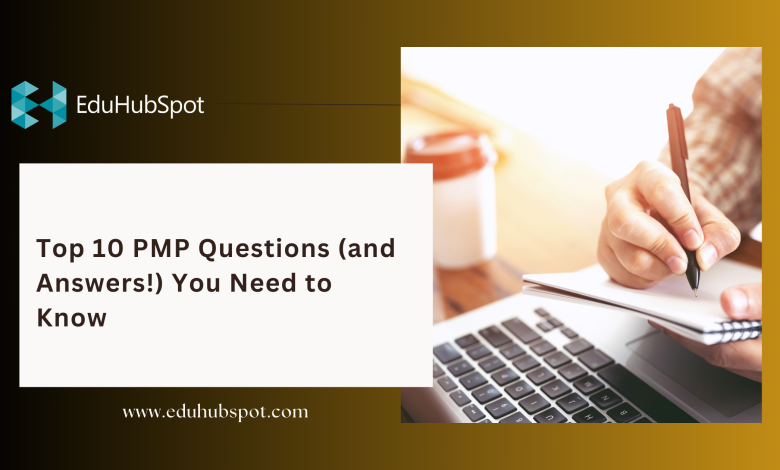Top 10 PMP Questions (and Answers!) You Need to Know

Introduction
Looking to ace your PMP exam to gain PMP Certification? Dive into this comprehensive guide covering the top 10 PMP questions and answers, designed to equip you with the knowledge and confidence to succeed. From project management methodologies to risk management strategies, we’ve got you covered!
Are you gearing up for your PMP exam? Feeling a bit overwhelmed with all the information you need to know? Don’t worry; we’ve got you covered! In this guide, we’ll walk you through the top 10 PMP questions and provide detailed answers to help you prepare effectively.
-
What are the key components of a project management plan?
A project management plan is a comprehensive document that outlines how a project will be executed, monitored, and controlled. Its key components include:
- Scope Management Plan
- Schedule Management Plan
- Cost Management Plan
- Quality Management Plan
- Resource Management Plan
- Communication Management Plan
- Risk Management Plan
- Procurement Management Plan
- Stakeholder Management Plan
-
What are the five process groups in project management?
Project management consists of five process groups:
- Initiating: Defining and authorizing a project or phase.
- Planning: Establishing the scope, objectives, and course of action to achieve the objectives.
- Executing: Carrying out the project plan.
- Monitoring and Controlling: Tracking, reviewing, and regulating the progress and performance of the project.
- Closing: Finalizing all project activities and formally closing the project or phase.
-
What is the difference between a risk and an issue in project management?
A risk is an uncertain event or condition that, if it occurs, may have a positive or negative effect on a project’s objectives. An issue, on the other hand, is a problem or concern that has already occurred and needs to be addressed to prevent negative impacts on the project.
-
What is the critical path method (CPM) in project scheduling?
The critical path method (CPM) is a project management technique used to determine the longest sequence of dependent activities and the shortest possible duration for completing a project. It helps project managers identify which activities are critical to the project’s timeline and which can be delayed without impacting the overall schedule.
-
What is the difference between qualitative and quantitative risk analysis?
Qualitative risk analysis involves evaluating risks based on their probability of occurrence and potential impact using subjective measures such as high, medium, or low. Quantitative risk analysis, on the other hand, involves assigning numerical values to risks to assess their potential impact on project objectives and prioritize risk response strategies.
-
What is a work breakdown structure (WBS), and why is it important?
A work breakdown structure (WBS) is a hierarchical decomposition of the total scope of work to be carried out by the project team. It breaks down the project deliverables into smaller, more manageable components, making it easier to plan, execute, and control the project.
-
What is the purpose of a change management plan in project management?
A change management plan outlines how changes to project scope, schedule, or budget will be identified, evaluated, approved, and implemented. It helps ensure that changes are properly managed and documented to minimize disruptions to the project and maintain stakeholder satisfaction.
-
What are the different types of project management methodologies?
There are various project management methodologies, including:
- Waterfall: Sequential approach with distinct phases and a linear progression.
- Agile: Iterative and flexible approach that emphasizes customer collaboration and rapid response to change.
- Scrum: Framework within the Agile methodology that focuses on iterative development cycles called sprints.
- Kanban: Visual management method that helps teams visualize workflow and optimize efficiency.
-
What is the purpose of a stakeholder register in project management?
A stakeholder register is a document that identifies all individuals, groups, or organizations impacted by the project and describes their interests, involvement, expectations, and influence. It helps project managers effectively engage with stakeholders throughout the project lifecycle to ensure their needs are met and their concerns are addressed.
-
How can earned value management (EVM) help project managers assess project performance?
Earned value management (EVM) is a project management technique that integrates scope, schedule, and cost measures to assess project performance and progress. It compares the value of work completed (earned value) to the actual cost incurred (actual cost) and the planned cost for the work completed (planned value), providing insights into schedule and cost variances and forecasting project outcomes.
FAQs
- How should I prepare for the PMP exam?
Answer: Start by thoroughly reviewing the Project Management Body of Knowledge (PMBOK) Guide and consider enrolling in a reputable PMP exam prep course. Practice with sample questions and simulated exams to familiarize yourself with the exam format and timing.
- How long is the PMP exam, and what is the passing score?
Answer: The PMP exam consists of 200 multiple-choice questions and has a time limit of 4 hours. To pass, you must achieve a score of at least 61% or 106 correct answers out of 175 scored questions.
- Can I use calculators during the PMP exam?
Answer: Yes, you can use a simple, non-programmable calculator during the PMP exam. However, advanced calculators with programmable functions are not allowed.
- How often is the PMP exam updated, and how can I stay informed about changes?
Answer: The PMP exam content outline is periodically updated to reflect changes in project management best practices. Stay informed by regularly visiting the official Project Management Institute (PMI) website and subscribing to their updates and newsletters.
- Is work experience required to sit for the PMP exam?
Answer: Yes, PMI requires candidates to have a minimum of 4,500 hours of project management experience (or 7,500 hours with a secondary degree) to sit for the PMP exam.
- What happens if I fail the PMP exam?
Answer: If you fail the PMP exam on your first attempt, you can retake it up to three times within one year of your eligibility period. However, you must pay a reexamination fee for each attempt.
- How can I maintain my PMP certification after passing the exam?
Answer: To maintain your PMP certification, you must earn 60 professional development units (PDUs) every three years and adhere to PMI’s Code of Ethics and Professional Conduct.
- Are there any prerequisites for applying for the PMP exam?
Answer: Yes, in addition to project management experience, PMI requires candidates to have completed 35 hours of formal project management education from a registered education provider (REP) or equivalent.
- Can I take the PMP exam online, or do I have to go to a testing center?
Answer: PMI offers both online proctored and in-person testing options for the PMP exam, allowing candidates to choose the option that best suits their preferences and circumstances.
- How long does it take to prepare for the PMP exam?
Answer: The time required to prepare for the PMP exam varies depending on your background, experience,
Author: Varun Anand is the Project management expert, PMP mentor and a trainer at EduHubSpot. His Project Management institute (PMI) certification includes Project Management Professional (PMP), PMI-ACP, PfMP, and CAPM. He has also done CSM certification from Scrum Alliance. Varun is an engineering graduate from the University of Maryland, Baltimore.
With over 10 years of experience in training students for PMP certification Exam, Varun is an internationally known Project Management speaker and educator. He has trained thousands of professionals, earning widespread respect in the industry. At EduHubSpot, he brings the practical side of Project Management to life, helping professionals master PMP from anywhere. He is also an experienced and renowned author.




